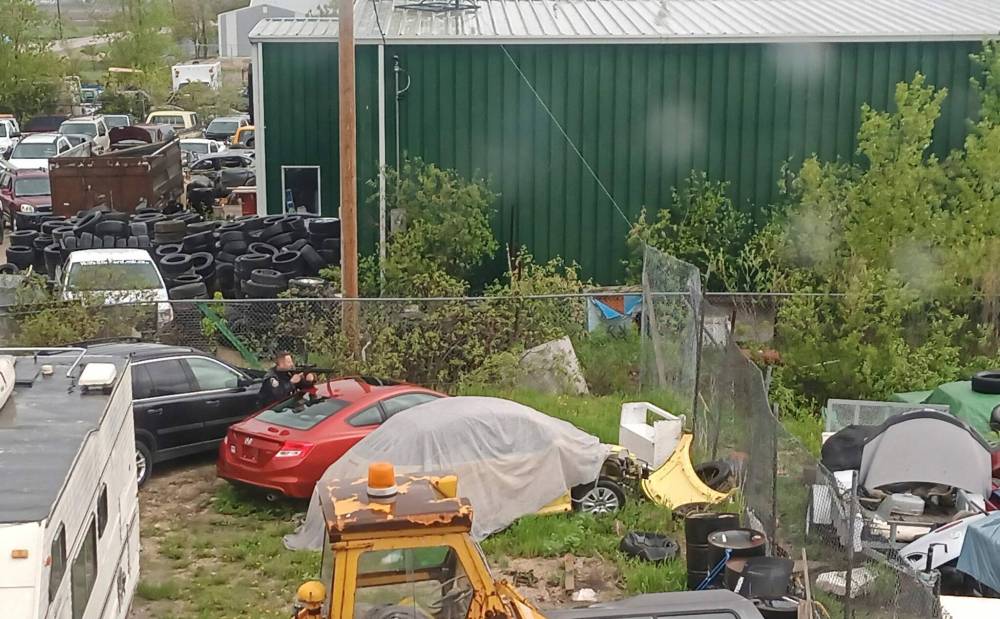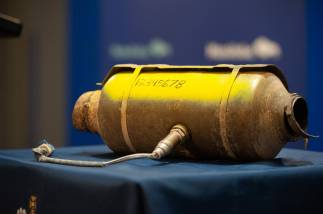New law, scrap yard bust take bite out of catalytic converter thefts
Read this article for free:
or
Already have an account? Log in here »
To continue reading, please subscribe:
Monthly Digital Subscription
$0 for the first 4 weeks*
- Enjoy unlimited reading on winnipegfreepress.com
- Read the E-Edition, our digital replica newspaper
- Access News Break, our award-winning app
- Play interactive puzzles
*No charge for 4 weeks then price increases to the regular rate of $19.00 plus GST every four weeks. Offer available to new and qualified returning subscribers only. Cancel any time.
Monthly Digital Subscription
$4.75/week*
- Enjoy unlimited reading on winnipegfreepress.com
- Read the E-Edition, our digital replica newspaper
- Access News Break, our award-winning app
- Play interactive puzzles
*Billed as $19 plus GST every four weeks. Cancel any time.
To continue reading, please subscribe:
Add Free Press access to your Brandon Sun subscription for only an additional
$1 for the first 4 weeks*
*Your next subscription payment will increase by $1.00 and you will be charged $16.99 plus GST for four weeks. After four weeks, your payment will increase to $23.99 plus GST every four weeks.
Read unlimited articles for free today:
or
Already have an account? Log in here »
Hey there, time traveller!
This article was published 20/09/2022 (1181 days ago), so information in it may no longer be current.
The flood of catalytic converter thefts in Winnipeg has slowed to a trickle following the implementation of a new anti-theft program and arrests at a rural scrap yard.
Winnipeg police said Tuesday only 31 catalytic converters were stolen in August, down from 78 in July. That compares to 353 in April and 283 in May. Thieves cut out the part, which is valuable because it contains precious metals, from the underside of vehicles and sell it to scrap yards.
“A combination of Project Precious, ongoing police enforcement, the new scrap metal act, and the Crime Stopper’s engraving program (has meant) the number of catalytic converter thefts reported to WPS has plummeted,” police said in a statement.
Project Precious was the name of the four-month investigation into the wave of thefts that culminated in arrests at a scrap yard in the RM of Springfield in June.
So far this year, 1,552 of the devices have been stolen in Winnipeg.
Victims whose vehicles were made inoperable after their catalytic converter was cut out greeted Tuesday’s news with joy.
“Wow,” said Maria Buccini, whose 2004 Honda Pilot was targeted in February while she worked in the Grant Park mall.
“That’s good. Whatever they are doing now appears to be working… it won’t affect me now, but it will help others. I can drive with peace of mind now.”
“That’s good. Whatever they are doing now appears to be working… it won’t affect me now, but it will help others. I can drive with peace of mind now.”–Maria Buccini
Ian Surdhar — whose vehicle was off the road for weeks after its catalytic converter was stolen last December, only to be stolen again after being fixed — is also pleased to hear the dramatic drop in number of thefts.
“I don’t know what did it, but it is a good thing, obviously,” Surdhar said.
“I was pleased to see all the changes come in, but whether it was the law coming in or the bust, I don’t know. But the fact there is heat on the culprits at least makes people think twice about taking them.”
Whereas only 14 catalytic converters were stolen in 2015, the number had jumped dramatically. In 2021, 1,564 were reported stolen.
The thefts were on pace to dramatically eclipse last year’s numbers until a police raid and a new provincial law took effect.
In June, police raided a scrap yard in Springfield; two men were charged with trading in large quantities of the stolen converters, which reduce harmful emissions from a vehicle’s exhaust system. A month later, four others were arrested at a traffic stop; stolen catalytic converters were found in their possession.
SUPPLIED Project Precious was the name of the four-month investigation into the wave of thefts that culminated in arrests at a scrap yard in the RM of Springfield in June.
A provincial law, the Scrap Metal Act, took effect in July to target the sale and purchase of the devices. By law, metal recyclers are now required to photograph and document all converters they buy and hand over their records to police each week. They are not allowed to pay more than $50 in cash for a converter.
In addition, more than 30 auto service centres in Winnipeg were given etching equipment so they could engrave vehicle ID numbers onto newly installed catalytic converters.
At the time, scrap recyclers bemoaned the changes, saying the extra paperwork would do little to reduce the incidence of theft.
Les Rattai, who manages J Max Collision and Glass in Fort Garry, said he has seen the results. Rattai paused when he was asked when the last catalytic repair came in.
DANIEL CRUMP / WINNIPEG FREE PRESS FILES “We’re still getting a few stragglers, but it has cut down lots,” said Les Rattai, who manages J Max Collision and Glass in Fort Garry.
“We’re still getting a few stragglers, but it has cut down lots,” Rattai said. “We were getting anywhere from one to five a week for quite awhile and now we’ve just had a couple in awhile.
“(The thieves) were taking them somewhere, but I guess if they can’t sell them, they don’t want them.”
Winnipeg police still advise the drivers “to remain mindful when parking your vehicle” by putting it in a locked garage and a well-lit area when possible.
As for Surdhar, he was already taking extra precautions to reduce the chance he’d be three times unlucky.
“I park over paving stones that I put on the driveway now. There is no room for anyone to get under the car,” he said.
“The paving stones were stolen at one point, so now I’ve glued them down, but it’s a lot easier to replace paving stones than to replace a catalytic converter.”
kevin.rollason@freepress.mb.ca

Kevin Rollason is one of the more versatile reporters at the Winnipeg Free Press. Whether it is covering city hall, the law courts, or general reporting, Rollason can be counted on to not only answer the 5 Ws — Who, What, When, Where and Why — but to do it in an interesting and accessible way for readers.
Our newsroom depends on a growing audience of readers to power our journalism. If you are not a paid reader, please consider becoming a subscriber.
Our newsroom depends on its audience of readers to power our journalism. Thank you for your support.













